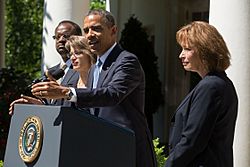Robert L. Wilkins facts for kids
Quick facts for kids
Robert L. Wilkins
|
|
|---|---|
| Judge of the United States Court of Appeals for the District of Columbia Circuit | |
| Assumed office January 15, 2014 |
|
| Appointed by | Barack Obama |
| Preceded by | David B. Sentelle |
| Judge of the United States District Court for the District of Columbia | |
| In office December 27, 2010 – January 24, 2014 |
|
| Appointed by | Barack Obama |
| Preceded by | James Robertson |
| Succeeded by | Randolph Moss |
| Personal details | |
| Born |
Robert Leon Wilkins
October 2, 1963 Muncie, Indiana, U.S. |
| Spouse | Amina Long |
| Children | 2 |
| Education | Rose–Hulman Institute of Technology (BS) Harvard University (JD) |
Robert Leon Wilkins (born October 2, 1963) is an American lawyer and a very important judge. He serves as a federal judge on the United States Court of Appeals for the District of Columbia Circuit. This court is one of the most important courts in the United States.
Before this, he was a judge for the United States District Court for the District of Columbia. He held that position from 2010 to 2014. His nomination to the D.C. Circuit court in 2013 was a big topic in the United States Senate. It even led to a special rule change to help his nomination get voted on.
Contents
Early Life and Education
Growing Up in Indiana
Robert Wilkins was born in 1963 in Muncie, Indiana. He grew up there, raised by his mother. He worked hard in school and was very dedicated to his studies.
College and Law School
Wilkins first studied chemical engineering at Rose–Hulman Institute of Technology. He graduated in 1986 with a special honor called cum laude. This means he had excellent grades.
After that, he went to Harvard Law School. While there, he was an editor for a law review journal. He earned his law degree in 1989.
Professional Career
Starting as a Law Clerk
After finishing law school, Wilkins worked as a law clerk. This means he helped a judge with their legal research and writing. He worked for Judge Earl Ben Gilliam in California from 1989 to 1990.
Working as a Public Defender
From 1990 to 2002, Wilkins worked at the Public Defender Service for the District of Columbia. A public defender is a lawyer who helps people who cannot afford a lawyer. He even led a special team there from 1996 to 2000.
Private Law Practice
Later, from 2002 to 2010, Wilkins worked at a private law firm in Washington, D.C.. He was a partner at the firm Venable LLP. In this role, he handled cases about patents and other legal issues.
Helping Create a Museum
Wilkins was also part of a special group that advised President George W. Bush. This group helped plan the Smithsonian Institution's National Museum of African American History and Culture. This museum is very important for telling the story of African Americans. Wilkins even wrote a book about this experience in 2016. The book is called Long Road to Hard Truth: The 100 Year Mission to Create the National Museum of African History and Culture.
Wilkins v. Maryland State Police
A Personal Experience with Profiling
In May 1992, Robert Wilkins was driving with his family. They were pulled over by the Maryland State Police. At that time, police officers in Maryland sometimes focused on stopping Black drivers in nice cars. This practice is known as racial profiling.
Taking Action in Court
Wilkins decided to take legal action. He filed a lawsuit called Wilkins v. Maryland State Police. He eventually won a very important agreement against the state of Maryland. This agreement was a big step forward.
Changing Police Practices
As part of the agreement, Maryland had to keep records of all traffic stops. This helped show if racial profiling was happening. The case brought national attention to racial profiling. It also helped make the term "driving while black" more widely known. This term describes when people are stopped by police mainly because of their race.
Federal Judicial Service
Becoming a District Court Judge
In 2010, President Barack Obama nominated Robert Wilkins to become a judge. He was nominated for the United States District Court for the District of Columbia. This court handles many important cases in the nation's capital.
The United States Senate confirmed his nomination on December 22, 2010. He officially became a judge on December 27, 2010. He served as a district court judge until January 24, 2014. At that time, he moved to a higher court.
Serving on the D.C. Circuit Court
On June 4, 2013, President Obama nominated Wilkins again. This time, it was for the United States Court of Appeals for the District of Columbia Circuit. This is a very powerful court, often called the second most important court in the U.S. after the Supreme Court.
The Confirmation Process
His nomination faced some challenges in the Senate. Some senators tried to block the vote using a tactic called a filibuster. However, the Senate eventually voted to move forward with his nomination.
On January 13, 2014, the Senate confirmed him as a judge for the D.C. Circuit. He officially started his new role on January 15, 2014. His confirmation was a big deal because it meant the D.C. Circuit Court had all its judges for the first time in over 22 years.
Later Work on the Court
In April 2018, Judge Wilkins wrote an important decision for the court. This decision was about how certain rules from the Federal Trade Commission should be reviewed. His work continues to shape important legal interpretations.
See also
 | Charles R. Drew |
 | Benjamin Banneker |
 | Jane C. Wright |
 | Roger Arliner Young |


